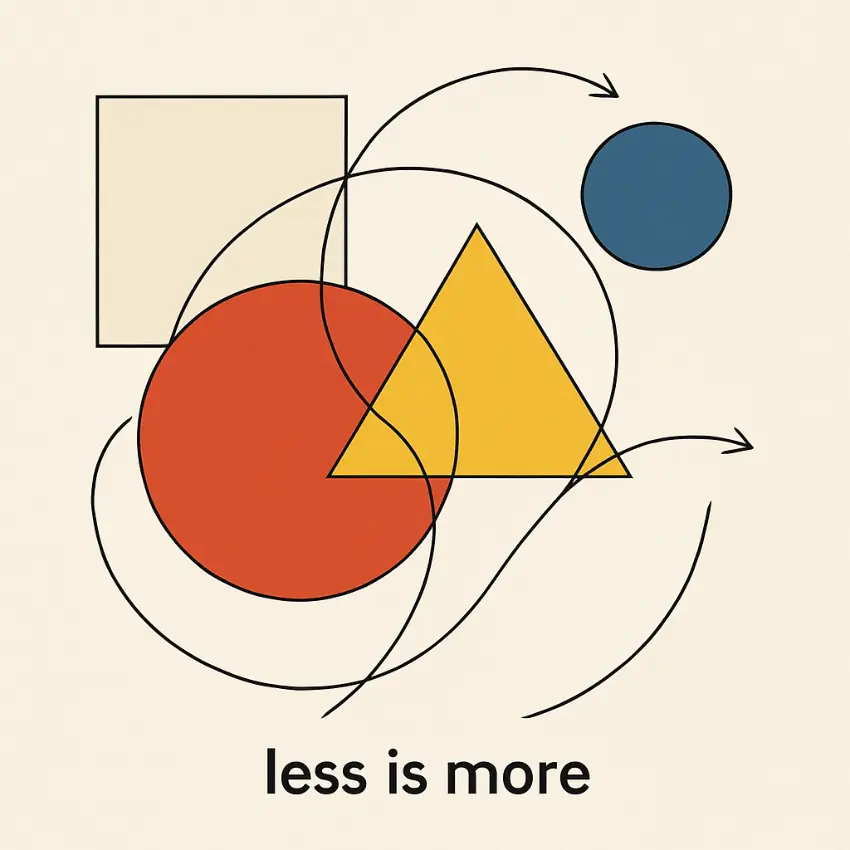The Art of Flow
less is more

The Art of Flow is more than a methodology—it's a way of thinking, designing, and living. At its core, Flow represents the seamless integration of efficiency and elegance, drawing from systems that revolutionized manufacturing and art movements that transformed aesthetics. By synthesizing the Theory of Constraints, Lean Manufacturing, and Flow Manufacturing with the refined simplicity and purposeful clarity of Modernism, Minimalism, and Bauhaus principles, the Art of Flow guides individuals and organizations towards a streamlined existence where form meets function effortlessly.
Flow begins by identifying constraints, those critical factors limiting overall performance, as emphasized by the Theory of Constraints. It then applies Lean Manufacturing's disciplined approach to eliminate waste and optimize processes, focusing relentlessly on value. Flow Manufacturing contributes by orchestrating processes in continuous motion, minimizing interruptions, and synchronizing tasks seamlessly.
Simultaneously, this approach embraces Modernism's pursuit of progress through innovative clarity, Minimalism's disciplined removal of excess, and the Bauhaus movement's elegant marriage of aesthetics and utility. Together, these principles foster a lifestyle and business philosophy that rejects clutter—both physical and mental—and cherishes harmony, clarity, and purpose.
In business, the Art of Flow transforms workplaces into dynamic environments where every process, from production lines to customer service interactions, is optimized for maximum efficiency and minimal waste. Leaders trained in Flow principles actively identify and remove bottlenecks, ensuring that their organizations remain agile, responsive, and consistently aligned with their core values and objectives.
In personal life, Flow encourages individuals to curate environments and routines that reflect purposeful simplicity. Homes and personal spaces become thoughtfully designed sanctuaries, devoid of unnecessary distractions, promoting clarity and tranquility. Daily routines, too, become refined practices—each action purposeful, every interaction intentional. The Art of Flow teaches individuals to appreciate the profound beauty of simplicity and the powerful productivity that emerges from a clear, focused mind.
Theory of Constraints emphasizes the strategic identification and management of bottlenecks to enhance overall system performance. In business, this leads to targeted improvements that elevate efficiency and profitability. Personally, it teaches individuals to identify key constraints in their lives, enabling more effective time management and goal attainment.
Lean Manufacturing focuses on eliminating waste and maximizing value. Businesses applying Lean principles benefit from increased productivity, reduced costs, and enhanced customer satisfaction. On a personal level, Lean practices encourage individuals to streamline their activities, eliminating unnecessary tasks and enhancing personal productivity and fulfillment.
Flow Manufacturing aims for uninterrupted and harmonious production processes. Businesses adopting Flow Manufacturing see smoother operations, improved throughput, and reduced downtime. Personally, this translates to maintaining consistent routines and habits that create a rhythm in daily life, fostering sustained productivity and reduced stress.
Modernism champions innovation, clarity, and functionality. In business, Modernist principles foster an environment where innovation thrives, and unnecessary complexities are avoided, leading to clear and effective communication and design. Personally, Modernism encourages a lifestyle defined by purposeful decisions and clear intentions, enhancing overall life satisfaction and effectiveness.
Minimalism prioritizes essential elements, discarding excess. Businesses benefit by simplifying their operations and focusing resources on core competencies. In personal life, minimalism supports mental clarity, reduced stress, and a deeper appreciation of fewer, higher-quality possessions and experiences.
Bauhaus principles integrate aesthetics with practicality. Businesses leveraging Bauhaus philosophies deliver products and services that blend aesthetic beauty with functional excellence, enhancing user satisfaction and brand reputation. Personally, Bauhaus encourages individuals to seek harmony in their surroundings, fostering environments that are both inspiring and efficient.
Adopting the Art of Flow reshapes not just workflows and spaces, but mindsets and aspirations. It cultivates an environment where simplicity inspires creativity, constraints foster innovation, and thoughtful design becomes a daily practice. Ultimately, Flow empowers us to transform the ordinary into the extraordinary, crafting lives and businesses marked by effortless productivity and timeless elegance.